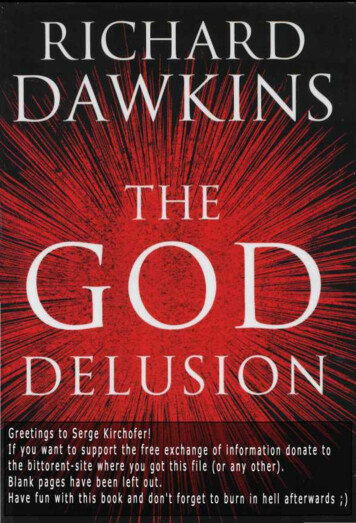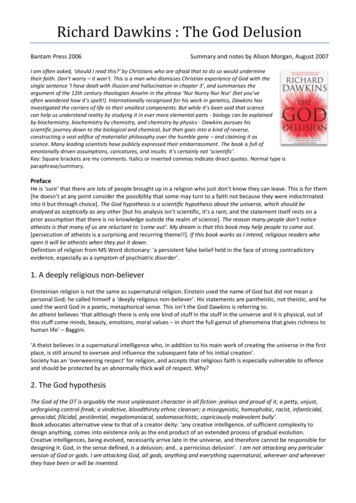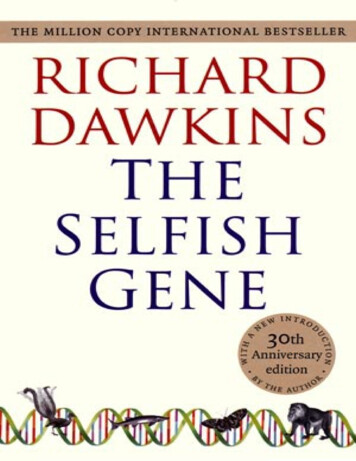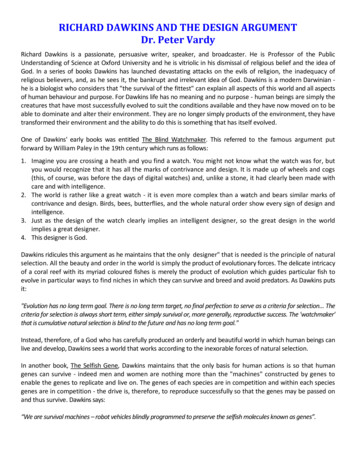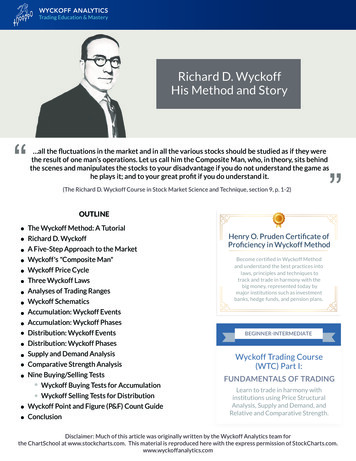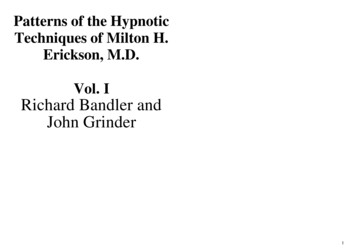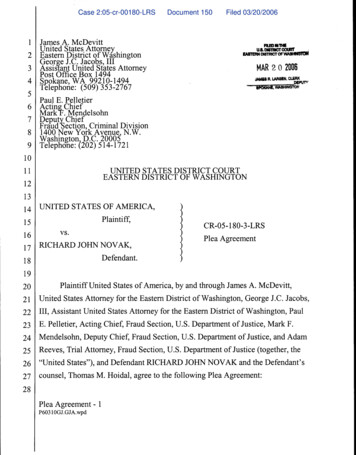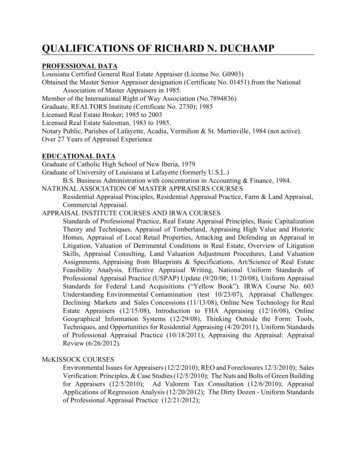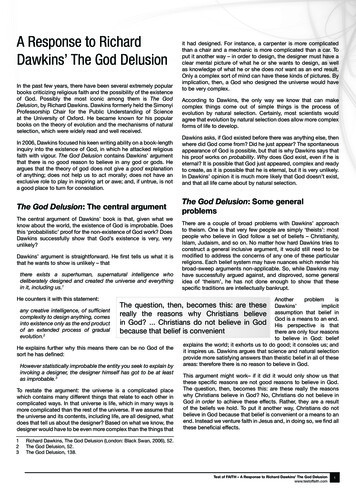
Transcription
A Response to RichardDawkins’ The God DelusionIn the past few years, there have been several extremely popularbooks criticizing religious faith and the possibility of the existenceof God. Possibly the most iconic among them is The GodDelusion, by Richard Dawkins. Dawkins formerly held the SimonyiProfessorship Chair for the Public Understanding of Scienceat the University of Oxford. He became known for his popularbooks on the theory of evolution and the mechanisms of naturalselection, which were widely read and well received.In 2006, Dawkins focused his keen writing ability on a book-lengthinquiry into the existence of God, in which he attacked religiousfaith with vigour. The God Delusion contains Dawkins’ argumentthat there is no good reason to believe in any god or gods. Heargues that the theory of god does not give a good explanationof anything; does not help us to act morally; does not have anexclusive role to play in inspiring art or awe; and, if untrue, is nota good place to turn for consolation.The God Delusion: The central argumentThe central argument of Dawkins’ book is that, given what weknow about the world, the existence of God is improbable. Doesthis ‘probabilistic’ proof for the non-existence of God work? DoesDawkins successfully show that God’s existence is very, veryunlikely?Dawkins’ argument is straightforward. He first tells us what it isthat he wants to show is unlikely – thatthere exists a superhuman, supernatural intelligence whodeliberately designed and created the universe and everythingin it, including us.1He counters it with this statement:any creative intelligence, of sufficientcomplexity to design anything, comesinto existence only as the end productof an extended process of gradualevolution.2According to Dawkins, the only way we know that can makecomplex things come out of simple things is the process ofevolution by natural selection. Certainly, most scientists wouldagree that evolution by natural selection does allow more complexforms of life to develop.Dawkins asks, if God existed before there was anything else, thenwhere did God come from? Did he just appear? The spontaneousappearance of God is possible, but that is why Dawkins says thathis proof works on probability. Why does God exist, even if he iseternal? It is possible that God just appeared, complex and readyto create, as it is possible that he is eternal, but it is very unlikely.In Dawkins’ opinion it is much more likely that God doesn’t exist,and that all life came about by natural selection.The God Delusion: Some generalproblemsThere are a couple of broad problems with Dawkins’ approachto theism. One is that very few people are simply ‘theists’: mostpeople who believe in God follow a set of beliefs – Christianity,Islam, Judaism, and so on. No matter how hard Dawkins tries toconstruct a general inclusive argument, it would still need to bemodified to address the concerns of any one of these particularreligions. Each belief system may have nuances which render hisbroad-sweep arguments non-applicable. So, while Dawkins mayhave successfully argued against, and disproved, some generalidea of ‘theism’, he has not done enough to show that thesespecific traditions are intellectually ion that belief inGod is a means to an end.His perspective is thatthere are only four reasonsto believe in God: beliefexplains the world; it exhorts us to do good; it consoles us; andit inspires us. Dawkins argues that science and natural selectionprovide more satisfying answers than theistic belief in all of theseareas: therefore there is no reason to believe in God.The question, then, becomes this: are thesereally the reasons why Christians believein God? . Christians do not believe in Godbecause that belief is convenientHe explains further why this means there can be no God of thesort he has defined:However statistically improbable the entity you seek to explain byinvoking a designer, the designer himself has got to be at leastas improbable.3To restate the argument: the universe is a complicated placewhich contains many different things that relate to each other incomplicated ways. In that universe is life, which in many ways ismore complicated than the rest of the universe. If we assume thatthe universe and its contents, including life, are all designed, whatdoes that tell us about the designer? Based on what we know, thedesigner would have to be even more complex than the things that123it had designed. For instance, a carpenter is more complicatedthan a chair and a mechanic is more complicated than a car. Toput it another way – in order to design, the designer must have aclear mental picture of what he or she wants to design, as wellas knowledge of what he or she does not want as an end result.Only a complex sort of mind can have these kinds of pictures. Byimplication, then, a God who designed the universe would haveto be very complex.This argument might work– if it did it would only show us thatthese specific reasons are not good reasons to believe in God.The question, then, becomes this: are these really the reasonswhy Christians believe in God? No, Christians do not believe inGod in order to achieve these effects. Rather, they are a resultof the beliefs we hold. To put it another way, Christians do notbelieve in God because that belief is convenient or a means to anend. Instead we venture faith in Jesus and, in doing so, we find allthese beneficial effects.Richard Dawkins, The God Delusion (London: Black Swan, 2006), 52.The God Delusion, 52.The God Delusion, 138.Test of FAITH – A Response to Richard Dawkins’ The God Delusionwww.testoffaith.com1
The God Delusion: The central problemThe God Delusion: The morality questionRegardless of whether Dawkins’ argument applies to any specificbelief system, we need to ask whether his main argument workson its own terms. There are several reasons why it does not.One important objection has to do with the nature of scientificevidence. Science is based on observation of the natural world,and presumably Dawkins would be quick to assert that hisevidence and arguments are based on his observations of thenatural world – including observation of what creative intelligencelooks like in the natural world. This means that Dawkins needs tomodify two of the statements we looked at earlier for the sake ofaccuracy.Having argued that there is no good reason to believe in God, andthat there are good reasons not to believe in God, Dawkins moveson to argue that there is no good reason to want to believe inGod. His tool for showing that religion is not just untrue, but alsounnecessary, is the moral Zeitgeist. This is a term for the way thatmoral standards change and develop through time.His argument is thatIt is beyond my amateur psychology and sociology to go anyfurther in explaining why the moral Zeitgeist moves in its broadlyconcerted way. For my purposes it is enough that, as a matter ofobserved fact, it does move, and it is not driven by religion – andcertainly not by scripture.4First of all:In our experience of the natural world, any creative intelligence,of sufficient complexity to design anything, comes into existenceonly as the end product of an extended process of gradualevolution.Dawkins has already defined God as supernatural. This couldmean many things, but one thing which it most certainly doesmean is that God is not natural and therefore, although able toact in the natural world, he is not a part of it. So we cannot assert,based on our experience and observation of the natural world,that a complex God would have had to come into existence as theend product of evolution, or even that a God who creates mustnecessarily be complex. In fact, if we define God as supernatural,there is no possibility that science will ever be able to comment onthis specific issue – even if it is able to comment on other issuesregarding belief, religious or otherwise. The realm of science isnature, and the assumption that nature is all that exists is a beliefthat lies beyond science.The Bible, according to Dawkins, is a very odd book because itwas written by many different people over a long period of time.One thing Dawkins says we can be sure of, though, is that itsuse as instruction or example in moral reasoning will result inhorrifying actions. Dawkins rubbishes the ways people interpretthe Bible as disingenuous. He thinks that people interpret it tofit with what they already believe is right, rather than using itgenuinely to criticize their own moral beliefs and actions. Dawkinssees this as a good thing, because taking the Bible at face valuewould lead to all kinds of despicable acts. The Bible may havebeen a helpful moral guide in its time, but it should not be usedas a moral signpost in our time, Dawkins asserts, because of thechanging moral Zeitgeist.There are two problems with Dawkins’ approach. First, Dawkinshas not taken the time to understand the way that scripturesfunction within their religious communities. Dawkins asserts thatany kind of interpretation of the Bible is simply an attempt tofinesse it to agree with our current moral climate.5 The evidenceWe can go further than this: time and space are a part of thehe gives for this is the variety of different moral perspectives thatnatural world. If God is supernatural, then he exists outside ofthe Bible has been used to support. This approach rules outtime and space. If he exists outside of time, he didn’t ‘come intothe possibility that we are still working to understand the Bible,existence’ at all – he just is. As an ‘absolute’ being, outside ofand that the work of understanding it is productive and providestime, God may indeed require an explanation. But he does notnew insights that we can incorporate into the life of the Christianrequire a causal or scientific explanation such as that offered bycommunity. Second, Dawkins has not actually proven his caseevolution by natural selection.that religion and scripture do not drive meaningful and positiveSecond:moral change. Dawkins gives examples of the changing moralZeitgeist, paying special attention to slavery, racism for example,In our experience of the natural world, however statisticallyto show that the general standards of morality have changed, andimprobable the entity you seek to explain by invoking a designer,have changed for the better. However, he has not convincinglythe designer himself has got to be at least as improbable.shown that this change is not a result of religious belief. Whilethe Bible has been used to support opposingAgain,Dawkinsmoral attitudes, this does not mean that ithas defined God asTherealmofscienceisnature,andthehas nothing meaningful to contribute. Wouldsupernatural, andit be asking for too much faith in humanassumptionthatnatureisallthatexistsisathis means that thisrationality (or the Holy Spirit guiding thestatement simplybelief that lies beyond science.church) to grant that, generally speaking, thedoes not apply tobetter interpretation wins the day? A perfectGod. In the naturalexample is one which Dawkins himself uses.world, according toHe says that part of the reason for advance in morality isour observations, anything that creates must be complex. But wecannot directly or easily apply this statement to God. Althoughthe increased understanding that each of us shares a commonclearly this does not work as a viable argument for belief, ithumanity with members of other races and with the other sex –does effectively remove Dawkins’ argument as a viable basis fordisbelief – probability does not apply in eternity.4 The God Delusion, 308.5‘We pick and choose which bits of scripture to believe, which bitsto write off as symbols or allegories. Such picking and choosing is amatter of personal decision, without an absolute foundation’ (The GodDelusion, 269).Test of FAITH – A Response to Richard Dawkins’ The God Delusionwww.testoffaith.com2
both deeply unbiblical ideas that come from biological science,especially evolution6Of course, anyone who has read through the long genealogies inGenesis,7 or Jesus’ story of the good Samaritan,8 will realize thatthe claim that ‘common humanity’ is an unbiblical idea is nonsense.Likewise, the idea that the knowledge of common humanity isinevitable given evolutionary science would be amusing, were itshistory not so tragic. Doubtless Dawkins would claim (and claimreasonably) that the widespread eugenics programmes in the earlytwentieth century were an inappropriate application of evolutionaryscience. But why is it then unreasonable for Christians to claim thatwhen the Bible is used to oppress, it is used incorrectly? In fact,key areas of moral development during the last few hundred yearshave indeed come out of arguments over correct interpretation ofthe Bible,9 and Western conceptions of human rights have beenthe result of this debate.Dawkins, however, dismisses the idea that religion could be theimpetus for widespread moral change. Rather, he says that ‘thereis a consensus about what we do as a matter of fact considerright or wrong: a consensus that prevails surprisingly widely. Theconsensus has no obvious connection with religion.’10 It should beobvious, however, that ‘no obvious connection’ is not the samething as ‘no connection’, and especially in such a complex arenaas the relationships between morality, culture and religion – wherenothing is particularly obvious and the things that appear to beobvious often turn out to be wrong.Theologian David Bentley Hart has argued very strongly that themodern moral consensus, which we in the West often assume isuniversal, is in fact a product of the change Christianity provoked6789The God Delusion, 307.E.g., Genesis 5.Luke 10:25–37.Cf. John W. de Gruchy and Steve de Gruchy, The Church Strugglein South Africa: 25th Anniversary Edition (Norwich: Canterbury Press,2004), and John W. de Gruchy, Confessions of a Christian Humanist(London: Fortress Press, 2006).10 The God Delusion, 298.when it impacted on Roman society.11 He argues that what Dawkinswould perceive as a slow-moving Zeitgeist is actually the result ofsuch a radical change in human history and morality that, evenafter two thousand years, its full effects have yet to be realized.Indeed, Hart challenges those who think otherwise to providesolid evidence – surely, he says, this kind of change should havehappened more than once. He asks, ‘What other large multiethnicempire, for instance, incubated a Christian morality?’12Dawkins concludes thatWhatever its cause, the manifest phenomenon of Zeitgeistprogression is more than enough to undermine the claim that weneed God in order to be good, or to decide what is good.13But this is obviously not true. Labelling the change in moralstandards as a change in ‘Zeitgeist’ does not explain the reasonfor change, which is something Dawkins has admitted he is notqualified to do. It is inconsistent for Dawkins to admit that he doesnot possess the necessary skills to explain a change in Zeitgeistwhile at the same time claiming that it is clearly not the result ofreligious belief.ConclusionRichard Dawkins has tried to argue that, all things considered, itwould be better not to believe in God because that belief doesnot explain anything and does not make us better. His argumentsare simply unconvincing.11 David Bentley Hart, Atheist Delusions: The Christian Revolution andIts Fashionable Enemies (London: Yale University Press, 2009).12 David Bentley Hart, ‘Origin of the Specious’, in First Things -specious]. Cf. Hart,Atheist Delusions, ‘Part Three: Revolution: The Christian Invention ofthe Human’.13 The God Delusion, 308.James Crocker graduated with an MTheol in Theology from the University of St Andrews in 2007. He workedas the research assistant on the Test of Faith project at the Faraday Institute for Science and Religion from2008-2010.Test of FAITH – A Response to Richard Dawkins’ The God Delusionwww.testoffaith.com3
The God Delusion: Taking it furtherWebsites and articles to download:Stephen Barr, ‘Barr: Dawkins, Unfortunately’.This is a short review article by the particle physicist Stephen Barr: http://www.firstthings.com/onthesquare/?p 506Alvin Plantinga, ‘The Dawkins Confusion: Naturalism “ad absurdum”. This is a short review by the Christian analytical philosopher AlvinPlantinga: htmlThere are more responses to The God Delusion linked on the Christians in Science website resources page, found at http://www.cis.org.uk/resources/dawkinsBooks:David Robinson, The Dawkins Letters: Challenging Atheist Myths (Christian Focus, 2007). This book contains a series of letterswhich were posted on Dawkins’ website. The author is a Free Church of Scotland minister who wrote these letters as chapter-by-chapterresponses to Dawkins’ book as he read it. They are intelligent, but not difficult to read.Alister McGrath, Dawkins’ God: Genes, Memes, and the Meaning of Life (Blackwell, 2004). McGrath wrote this book, before TheGod Delusion was published, as a rebuttal of ideas present in Dawkins’ other writings. It is written at a popular level and attempts toanalyze and critique Dawkins’ worldview. It is probably best suited for those with some previous knowledge of the issues involved.Alister McGrath, The Dawkins Delusion?: Atheist Fundamentalism and the Denial of the Divine (SPCK, 2007). This book is apopular-level response to The God Delusion. Rather than rebutting Dawkins point by point, McGrath addresses the general issues ofwhether science and religion are really in conflict, and whether religion is actually as evil a thing as Dawkins suggests.John Cornwell, Darwin’s Angel: An Angelic Riposte to The God Delusion (Profile Books, 2008). John Cornwell is an author, ajournalist, and director of the Science and Human Dimension Project at Jesus College, Cambridge. This book is a witty, popular-levelbook written from the perspective of an angel. It contains chapters devoted to many of the specific issues brought up by Dawkins.David Bentley Hart, Atheist Delusions: The Christian Revolution and Its Fashionable Enemies (Yale University Press, 2009). DavidBentley Hart is an Orthodox theologian in the United States. This book looks at the way that Christianity changed Roman culture andformed the basis of Western culture. Critics of Christianity, Hart argues, have missed the fact that many of the positive benefits theyattribute to secularism are regarded as positive in our culture because of the influence of Christianity.Patrick Richmond, ‘Richard Dawkins’ Darwinian Objection to Unexplained Complexity in God’, in Science and Christian Belief(19), Oct 2007, pp. 99–116. This academic journal article summarizes and critiques many of the arguments against Dawkins and thenoffers a better critique of Dawkins which avoids the pitfalls of other responses.The God Delusion: A general summaryTo fully engage with Dawkins’ arguments you will need to read the book for yourself, but this summary may be a useful start.Chapter 1: A Deeply Religious Non-believerDawkins begins his argument with two ideas: 1) Religion is given too much respect in society and therefore is not discussed openly. 2)He will give religion proper respect by examining it in a scientific manner.Chapter 2: The God HypothesisDawkins continues with a survey of different religious beliefs and the ways in which these beliefs have been seen to be compatible withscience.Chapter 3: Arguments for God’s ExistenceDawkins then proceeds to list some of the ‘proofs’ for the existence of God and explains why he thinks they are not convincing.Test of FAITH – A Response to Richard Dawkins’ The God Delusionwww.testoffaith.com4
Chapter 4: Why there Is Almost Certainly No GodDawkins asserts that we cannot account for the diversity of the world by appeal to God, because any thing that creates complexitymust be more complex than the object it creates. You then have to explain the creator. Only natural selection provides a way to explaincomplexity without postulating further complexity.He then presents an alternative explanation of the present complexity of the world: the biological world by reference to evolution bynatural selection; and the fine-tuning of the planet and universe by invoking a version of the Anthropic Principle and multiverse theory.Chapter 5: The Roots of ReligionHaving concluded that science makes God improbable, Dawkins explains where religion comes from by looking to evolutionarypsychology. For various reasons, impulses that have survival value in children and adults combine to give us an irrational predispositionto religion.Chapter 6: The Roots of Morality: Why Are We Good?Dawkins makes the same evolutionary argument for our moral sense, after concluding that religion does nothing to enforce morality.Chapter 7: The ‘Good’ Book and the Changing Moral ZeitgeistThe pictures of God and morality put forward in the Bible are not moral. To even say whether they are moral or not we must comparethem to some other standard, which would mean that they cannot be the standard for morality!Chapter 8: What’s Wrong with Religion? Why Be so Hostile?Dawkins moves to assume that the world would be better without the absolutist morality of religion, which does not seem to make adifference anyway. He favours the consequentialist approach which judges actions by their consequences – or, to put it another way, byhow much suffering an action causes or avoids, regardless of species.Chapter 9: Childhood, Abuse, and the Escape from ReligionDawkins asserts that teaching children to believe in a religion is a form of mental child abuse because they have no choice in choosingtheir beliefs. Religion is damaging because it teaches children not to be curious about the world, and it fosters fundamentalism andabsolutism.Chapter 10: A Much Needed Gap?Religion, Dawkins says, is used to fill four roles:Explanation – but it is superseded by scienceExhortation – but it doesn’t seem to have any effect morallyConsolation – but the fact that it is consoling doesn’t make it true, and false consolation may not be a good ideaInspiration – but this is a matter of taste, and it might be better to find inspiration somewhere else, like scienceTest of FAITH – A Response to Richard Dawkins’ The God Delusionwww.testoffaith.com5
A Response to Richard Dawkins’ The God Delusion In the past few years, there have been several extremely popular books criticizing religious faith and the possibility of the existence of God. Possibly the most iconic among them is The God Delusion, by Richard Dawkins
